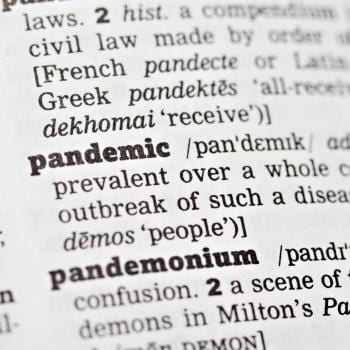I had just watched the dam deliver her fourth lamb, with help from the foreman of this lovely farm in the Cotswolds. This particular breed of sheep tend to give birth to twins regularly, but quads are highly unusual, and we just happened to be there at the right time to observe.
Here’s the video. Be aware that it is “narrated” by the voices of four young children (4-7) who are a bit grossed out by the process, even as they stand there fascinated.
http://www.youtube.com/watch?v=NQ-QFy4c7hw
Before this birth, the foreman, a kind and patient man, had given the tour of the lambing areas to me, my son and his wife, my nephew and the four children. He and I had already spoken about the several sets of triplets born this season and the challenges of getting a dam to adopt one.
Ewe’s have only two teats, so it is nearly impossible for more than two offspring at a time to survive without sending one to another mother. But it often takes three to ten days of hard work (and restraints of her head and movement) for an adoption to “take” and that can only happen if an otherwise healthy dam has herself given birth to a singleton, fairly rare among this breed.
We had already toured the older lamb area (lambs from three to 10 days old), the just-born pens (two hours to two days post birth) and were heading into the holding area where the rest of the extremely pregnant sheep waited.
The dam in the video had just given birth to triplets when she suddenly showed signs of yet another birth. As we waited, I got into further conversation with the foreman about the survival rate of the lambs. He noted that he had to help with a fair number of the births and that it was not rare for untended ewes die when a lamb was not emerging properly (feet first).
He then said, “they die for any reason” as he spoke further of the complications of keeping these placid but unintelligent creatures alive.
Just then he noted that this fourth lamb was emerging in a problematic matter, so went to get his elbow-length gloves and get her a hand. A couple of minutes later, as the video shows, she was safely delivered of number four, and was doing the motherly licking and stimulating for the infant, who was soon up and about.
It was all very sweet and powerful for all . . . but I knew that in all likelihood two of those lambs would have to be disposed of if any of them would have a chance to live. There weren’t any singleton births so far that day, and unless a couple happened quickly (at least a hundred more dams stood around, waiting their time), adoption would not be possible.
He and I engaged a meaningful glance when he was asked what he would do about the quads, but no words were spoken lest the children overhear.
A few minutes later the children became restless, so I accompanied them outside the shed so they could expend some energy without upsetting the sheep. As they ran around the shed, one of them said, “There are dead lambs here.”
I followed them and found a dam in a pen with two dead lambs just outside the pen. Clearly, something had gone very wrong. I gently explained to the children that sometimes, these things just happened and not every newborn stayed alive.
My oldest grandson, after standing still for quite a while, and then reaching out a gentle hand to pet the mother, said, “I wish I could bring them back to life.”
I found out later that she had a prolapsed uterus, and would need to be put down.
Now, all this is normal for those living in the world of animal husbandry. Life comes, death happens, the cycle continues. But sheep, not noted for their intelligence or sense of survival, need lots of care if they are going to survive, much less thrive.
Again, to quote the foreman, they “die for any reason.”
In the Scriptures and in the words of Jesus, people are often referred to as “sheep” and those who guide them as “shepherds.” It is from that word that we get the word, “pastor.”
Now, I doubt sheep were any smarter back then than they are now. And the life of a shepherd (pastor) was anything but romantic, gentle, full of sunshine and frolic.
Shepherds had to be on constant alert to cunning and dangerous predators. Although cooperation among other shepherds helped the survival of all, not all shepherds operated by the rules either.
Sheep do need to drink from still waters–not always easy to find. Rich pastures are often grazed over or parched by inadequate rainfall before the flock arrives.
It was an isolating, dangerous and draining job–with shepherds often away and alone for extended periods of time.
And no matter what, the sheep still died for any reason. Their stupidity, their bent for self-destruction, their vulnerability to disease, their predilection for getting lost, the many dangers about–death was a constant.
It was not a nice life. The youngest and least important family members were given the duty.
No, not a nice life at all.
But a necessary one–without fertile and healthy sheep, people would not eat or have clothing.
And sheep die for any reason, just as people leave behind spiritual life and health for any reason. This is the human condition.
I see this now in the perspective of a recently retired pastor. I am just now beginning to see my energy returning from those years of being ever-vigilant to watch over my flock.
Recently, I heard that some Mormons are going after some of the youth of the church I served. I found myself swimming in anguish. I know how this works, the idea of being special, of suddenly “discovering” that all that has been taught to them for years is hogwash and wrong and they now have the real truth. But the Mormons will hide their real inner truths until the new recruits are enmeshed in Mormon culture and can’t find a way out.
It’s called “poaching” in the animal world. And the shepherd must fight to the finish for something like this.
Then there are the big glitzy churches, many of which proclaim words of condemnation for those who are on the outside of their multi-page doctrinal statements, but easily entice others to come in because their gymnasiums are full-fledged entertainment facilities for young people–and who can resist that kind of rich-looking grass?
How about the attractions of what look like green pastures but are really fields of poisonous weeds that can and do bring soul death for those who decide that the guidance of a shepherd is no longer needed and they are so “spiritual but not religious” that they can discern all truth in isolation?
That’s what sheep do–and we human shepherds don’t have the power of the shepherd’s crook to pull them back from the danger.
Being a pastor/shepherd means grief over these sheep that die for any reason. I found it a life of nearly constant heartbreak, but with heartbreak gloriously punctuated by the live births, by the sheep that went on to maturity, giving life to others all along the way.
This is just a suggestion for any who read this–tell your pastor “thanks” today. Thanks for hard work of finding the still waters and the good pastures. For the vigilance which is so often misunderstood. For the 24/7 care that the job involves.
Have some compassion on their loneliness, and honor their grief. It’s tough work–and I would not have traded those years for any other occupation in the world.
















